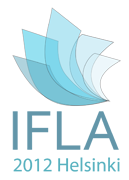Conference Session 120
The dual mode of scholarly communication, challenges and opportunities for librarians, libraries and the profession
Open Access Taskforce
Congress track 1: Open access and digital resources.
14 August 2012 09:30 - 12:45 | Room: Session Room 5
-
Open Access and the role of libraries
ELLEN R. TISE, Past President, IFLA (Library and Information Services, Stellenbosch University, South Africa) -
Open Access - the balance August 2012 -overview (policy, mandates, stakeholders, numbers, geographical spread etc.)
LARS BJØRNSHAUGE (SPARC Europe & Chair, IFLAs Open Access Task Force) -
SCOAP3 - Sponsoring Consortium for Open Access Publishing in Particle Physics, latest developments
JENS VIGEN (Library Director, CERN, Switzerland) -
How can libraries make financial and human resources available for coping with OA:
RICK LUCE (University Libraries, University of Oklahoma, USA) -
What are new skills libraries need to have at hand in order to manage OA and indeed play a major role in the development and implementation of an OA-infrastructure: Open Access content management and skills required
ANGELA REPANOVICI, (Transilvania University, Brasov, Romania) -
Moving towards an open access future: the role of academic libraries. Selected findings from a Roundtable discussion organised by SAGE
LARS BJØRNSHAUGE (SPARC Europe & Chair, IFLAs Open Access Task Force) - Panel with the speakers, questions and discussion: Theme how can/should libraries collaborate in order to have a role in the emerging future, where open access content will be the default.
Librarians, libraries and library associations have played a major role in the progress of OA and will continue to do so. However, now that OA is maturing and entering the mainstream, the challenges and opportunities are becoming more serious.
Scholarly communication and publishing is increasingly characterized by the dual mode: subscription based (SB) and open access (OA). With the ever increasing momentum for OA and openness the reality is that for the foreseeable future libraries will have to deal with both SB content and OA. Yet there are no signs that the costs of acquiring and handling SB content will be reduced, or that the funds for library operations will increase.
Therefore, if libraries still want to play a role in the progress and actual implementation of OA, and given that the overall funds for library operations will not increase, how should libraries cope with the challenges inherent in this most probable scenario? How can libraries position themselves to take advantage of the various opportunities this scenario offers as well?
The challenges apply to various dimensions in library operations. Our session will look at the following issues:
- Managing OA content in the widest sense: New skills, qualifications and competencies are needed to manage OA publications, research data and open educational resources. What are these skills and are they at hand today? If not, how should the profession, the library organizations and library managers ensure these skills will be available soon?
- Managing Dual Content: If libraries want to deal more with OA content but still have to deal with SB without additional financial and human resources, what are their options? Will libraries have to "outsource" operations to external entities/organizations? Or should libraries give in on autonomy and let regional/national entities negotiate and decide on licensing digital content? Are there other options to reduce costs of handling SB content?
- Developing Infrastructure: OA is still in an early stage, but with the advent of sustainable business models and increasing mandates from research funders, governments and supranational organizations such as the EU, there is a growing need for an OA infrastructure and services that allows OA content to be seamlessly integrated in library systems and services. Libraries need to support, develop and implement such infrastructure and services but this requires financial and human resources. How can libraries and library organizations contribute?
Last update: 11 August 2012

